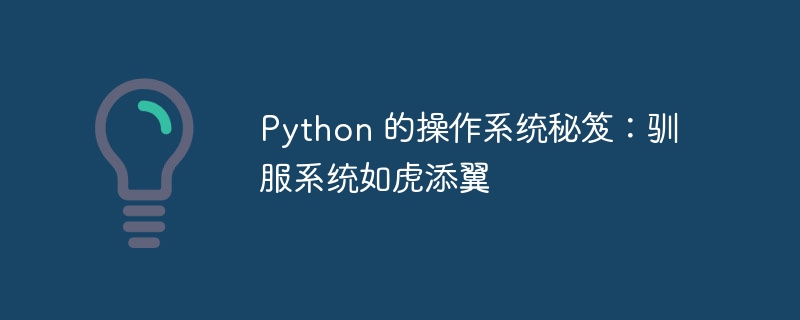

Manage files and directories:
listdir() function of the os module to list files in the directory. os.path module. glob The module provides powerful pattern matching capabilities to search for specific types of files. Control process:
subprocess module to create and manage subprocesses and execute external commands. multiprocessing The module supports parallel programming, creating multiple processes running simultaneously. threading module allows you to create and synchronize threads, thereby achieving concurrent operations. Interacting with the system:
operating system <strong class="keylink"> and system hardware through the </strong>platfORM module. os.environ The dictionary provides access to environment variables. shutil The module provides advanced functionality for file operations, such as copying trees and archiving files. Monitor system resources:
resource The module provides insights into system resource usage, including CPU usage, memory usage and io statistics. psutil The library provides a cross-platform interface for more advanced system monitoring. Automated system tasks:
schedule module to perform tasks regularly, such as backing up or cleaning up junk files. crontab The crontab module allows you to set commands to be executed at specific times or events. Sample code:
# Get the file list in the current directory
import os
files = os.listdir(".")
# Create a new file
with open("newfile.txt", "w") as f:
f.write("Hello World!")
# Use multiple processes to execute tasks in parallel
import multiprocessing
def my_task():
print("This is a task running in a separate process.")
if __name__ == "__main__":
p = multiprocessing.Process(target=my_task)
p.start()
# Monitor CPU usage
import resource
usage = resource.getrusage(resource.RUSAGE_SELF).ru_utime
print(f"CPU usage: {usage} seconds")Boost Python script:
In addition to the functions provided by the standard library, there are a large number of third-party libraries that can extend python's operating system interaction capabilities, such as:
pywin32: Interact with COM objects on windows systems. ctypes: Interacts with the C language library on linux, MacOS and Windows systems. docopt: Library for parsing parameters from command line arguments. Master these advanced techniques and you'll be able to write powerful and flexible Python scripts, automate tasks, monitor system health, and take full control of your computer.
The above is the detailed content of Python's operating system tips: Taming the system becomes even more powerful. For more information, please follow other related articles on the PHP Chinese website!
 What exchange is EDX?
What exchange is EDX?
 Usage of velocity annotation
Usage of velocity annotation
 How to turn off windows security center
How to turn off windows security center
 What language can vscode be written in?
What language can vscode be written in?
 How to save pictures in Douyin comment area to mobile phone
How to save pictures in Douyin comment area to mobile phone
 How to recharge Ouyiokx
How to recharge Ouyiokx
 How to use shift backdoor
How to use shift backdoor
 Windows 10 startup password setting tutorial
Windows 10 startup password setting tutorial
 What are the drawing software?
What are the drawing software?




